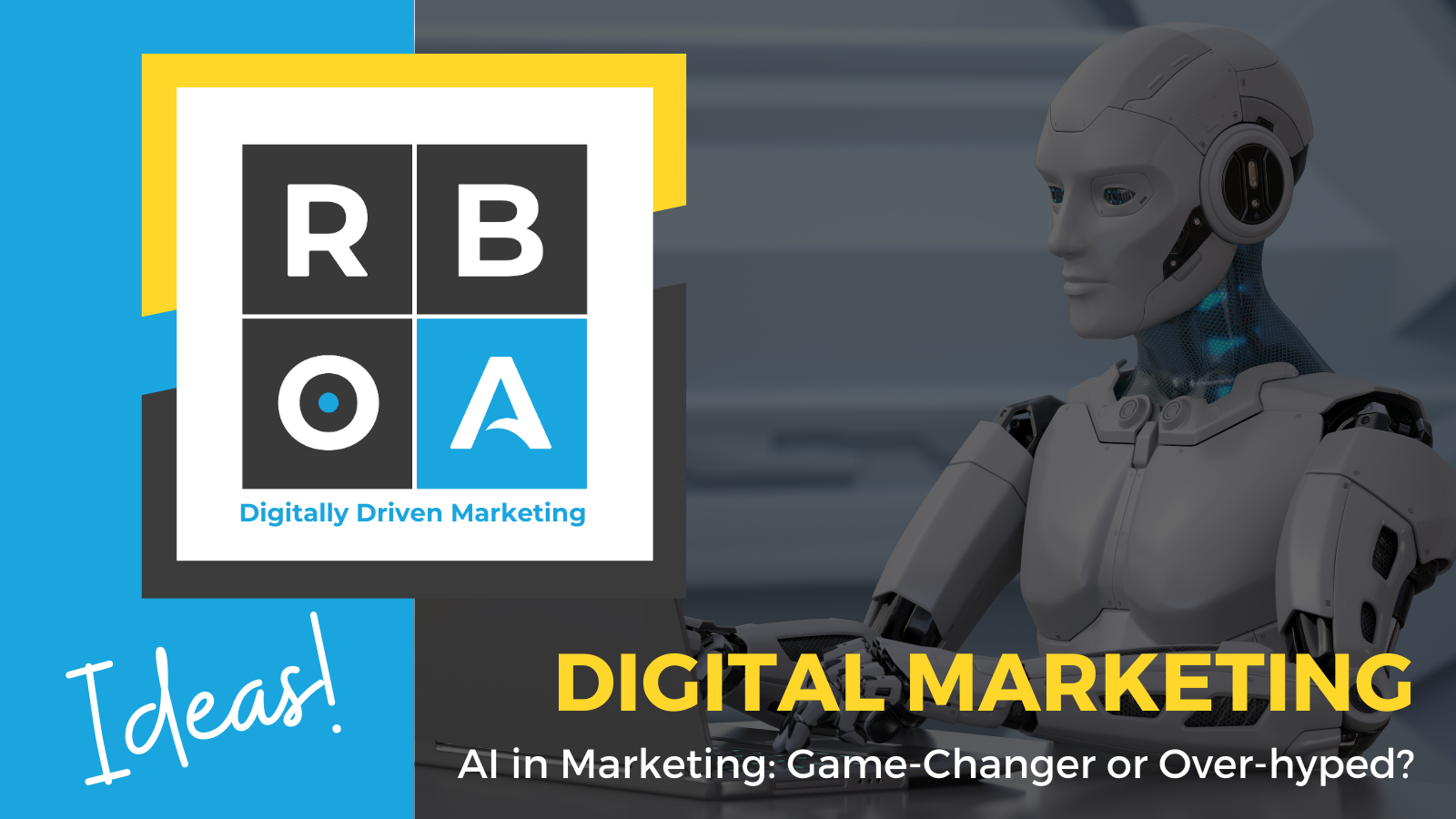At RBOA, we pride ourselves on being at the forefront of Digitally Driven Marketing, always looking for the next innovation to help our clients achieve their goals. In recent years, artificial intelligence (AI) has been heralded as a transformative force in marketing. From chatbots to predictive analytics, it seems AI is everywhere, promising efficiency, personalization, and game-changing results. But is AI living up to the hype, or are we too quick to pin our hopes on technology? Let’s break it down.
What AI Brings to the Table
First, let’s talk about what AI does exceptionally well. At its core, AI excels at processing and analyzing large volumes of data—tasks that would take humans countless hours to complete. This ability enables marketers to:
- Understand customer behavior: AI can analyze patterns from vast datasets to predict what customers want when they’ll want it, and how they’ll engage with your brand.
- Personalize content: From email campaigns to website experiences, AI allows for hyper-targeted messaging tailored to individual preferences.
- Automate repetitive tasks: Chatbots, automated reporting, and social media scheduling are just a few examples of how AI can free up time for marketers to focus on strategy.
Real-World Applications
Here are some ways we’ve seen AI create tangible results for businesses:
- Chatbots and Virtual Assistants: AI-powered chatbots can provide 24/7 customer support, answering common questions and directing more complex inquiries to human representatives. For one of our clients, implementing an AI chatbot reduced response time by 60% and improved customer satisfaction scores.
- Predictive Analytics: AI tools can predict trends and customer behaviors, helping businesses make data-driven decisions. For example, we use AI-driven platforms to optimize ad spend by identifying which audiences are most likely to convert.
- Content Creation: AI tools like Jasper and ChatGPT can generate blog posts, social media captions, and even ad copy. While these tools shouldn’t replace human creativity, they can be a great starting point for content brainstorming.
The Hype Factor: Where AI Falls Short
While AI offers incredible opportunities, it’s not a magic bullet. Here are a few areas where the reality of AI doesn’t always match the hype:
- Lack of Human Touch: AI can analyze data and generate content, but it lacks the creativity, empathy, and cultural nuances that come naturally to humans. For instance, an AI might suggest a perfectly optimized keyword strategy but fail to capture the emotional connection that resonates with your audience.
- Data Dependency: AI is only as good as the data it’s fed. Poor-quality data or biased datasets can lead to inaccurate insights and ineffective campaigns.
- Complexity and Cost: Implementing AI tools often requires significant investment—both in terms of money and time. Smaller businesses may struggle to justify the cost without a clear understanding of ROI.
Striking the Right Balance
At RBOA, we believe AI is a tool, not a replacement for human expertise. The key is knowing when and how to leverage AI to enhance your marketing efforts without losing sight of the human element. Here’s how we integrate AI into our strategies:
- As a Complement, Not a Crutch: We use AI to analyze data and provide insights, but our team’s expertise ensures those insights are applied strategically and creatively.
- For Personalization at Scale: AI enables us to deliver personalized experiences to large audiences, but we still rely on human intuition to craft the overarching message.
- To Enhance Decision-Making: AI helps us identify opportunities and optimize campaigns, but our team’s experience ensures those opportunities are aligned with our clients’ goals.
How Small Businesses and Nonprofits Can Leverage AI
For smaller organizations, the idea of incorporating AI might seem daunting. However, there are accessible and affordable ways to get started:
- Social Media Management: Tools like Buffer and Hootsuite use AI to recommend optimal posting times and analyze engagement metrics.
- Email Marketing: Platforms like Mailchimp and Constant Contact leverage AI to automate email campaigns and personalize content.
- Customer Insights: Google Analytics and other free tools use AI to provide actionable insights about website traffic and user behavior.
Even small steps, like using an AI-driven scheduling tool, can make a big difference in efficiency and effectiveness.
The Future of AI in Marketing
Looking ahead, the potential for AI in marketing is enormous. Here are some trends we’re watching:
- Voice Search Optimization: With the rise of smart speakers and voice assistants, optimizing content for voice search will become increasingly important.
- Advanced Predictive Analytics: AI will continue to improve in predicting customer behavior, allowing for even more precise targeting.
- Augmented and Virtual Reality: AI-powered AR and VR experiences could revolutionize how customers interact with brands online.
The Wrap:
At RBOA, we’ve seen firsthand how AI can be a game-changer for businesses. It’s helped us deliver more targeted, efficient, and impactful campaigns for our clients. But we’ve also learned that AI is most effective when paired with human creativity and expertise.
So, is AI a game-changer or over-hyped? The answer depends on how you use it. With the right strategy, AI can amplify your marketing efforts and drive real results. But without the human element, it’s just another tool.
RBOA is a digital marketing agency with a 40-year legacy of creativity, smart strategy, and fresh thinking that delivers award-winning communications and successful results. We provide clients with a unique, omnichannel blend of advertising, social media, digital marketing, and web design services.
If you are interested in learning more about digital marketing for your organization, we hope you will reach out to RBOA to schedule an exploratory call.

